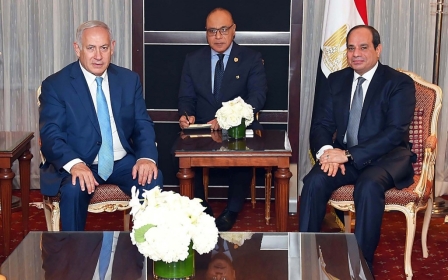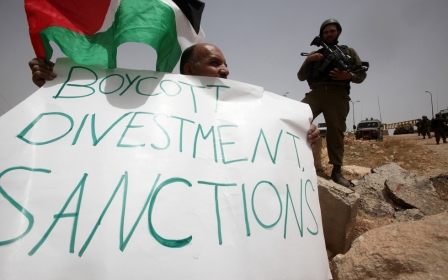Normalisation deals with Israel no 'substitute for peace', US State Department says

Recently cemented normalisation deals between several Arab countries and Israel cannot replace peace negotiations with the Palestinians, a US State Department spokesman says.
In his first official news conference, State Department spokesman Ned Price stressed that while the previous administration's work to establish the normalisation deals is welcomed as progress, advancing peace between Israel and the Palestinians remains a priority.
'The suspension of aid to the Palestinian people has neither produced political progress nor secured concessions from the Palestinian leadership'
- Ned Price, US State Department
"While we support normalisation between Israel and countries in the Arab world, it's also not a substitute for Israeli-Palestinian peace, and that's very important," Price said during Tuesday's briefing.
"We hope that as Israel and other countries in the region join together in a common effort to build bridges and create new avenues for dialogue and exchange, these efforts contribute to tangible progress towards the goal of advancing a negotiated peace between Israelis and Palestinians," he continued.
The United Arab Emirates, Bahrain, Morocco and Sudan signed a US-brokered agreement to normalise ties with Israel during the final months of the Trump administration.
New MEE newsletter: Jerusalem Dispatch
Sign up to get the latest insights and analysis on Israel-Palestine, alongside Turkey Unpacked and other MEE newsletters
The agreements, known as the "Abraham Accords", shattered a longstanding Arab consensus that there should be no normalisation with Israel until it reaches a comprehensive peace deal with the Palestinians.
Palestinian leadership has expressed dismay over the deals, which it largely sees as a betrayal of Palestinian goals for statehood.
Newly appointed Secretary of State Antony Blinken has previously praised the normalisation pacts, stating that the US "will continue to urge" other countries to follow suit.
Resumption of aid
Still, the Biden administration also has plans to pull away from the previous White House's policy - namely, by restoring aid to the Palestinians and reopening diplomatic relations between the US and Palestine.
During the news conference on Tuesday, Price said that the State Department plans to reverse the Trump administration's aid cuts to the Palestinians "very quickly".
"The suspension of aid to the Palestinian people has neither produced political progress nor secured concessions from the Palestinian leadership," Price said. "Of course, it has only harmed innocent Palestinians."
Price went on to stress that the resumption of such aid did not indicate that the US was working in favour of the Palestinians.
"We're not doing that as a favour, but because it’s in the interest of the United States to do so," Price said.
"The United States will reinvigorate our humanitarian leadership and work to galvanise the international community to meet its humanitarian obligations, including to the Palestinian people," he continued.
The US deputy assistant secretary for Israel and Palestine, Hady Amr, spoke by phone with Palestinian leadership on Monday, including Minister of Civil Affairs Hussein al-Sheikh.
In a post to Twitter, Sheikh said the conversation was "positive" and that "it was agreed to continue communication".
Middle East Eye delivers independent and unrivalled coverage and analysis of the Middle East, North Africa and beyond. To learn more about republishing this content and the associated fees, please fill out this form. More about MEE can be found here.





